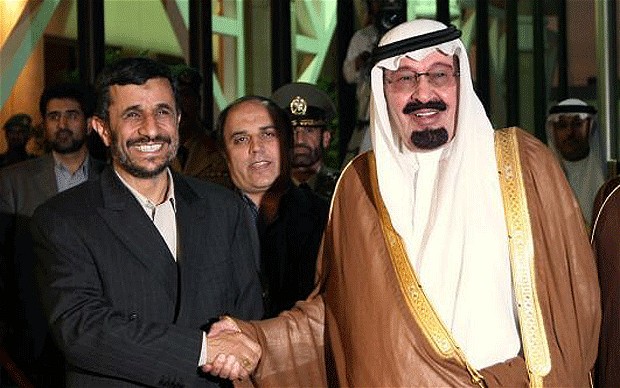Relations Between Iran And Saudi Arabia Might Improve In 2016

The Economist
Since the Shah of Iran was overthrown in 1979, Saudi Arabia, which sees itself as the leader of the Middle East’s Sunni Muslims, has faced off against the hostile Shia Muslim power on the other side of the Gulf. In an always dangerous relationship between Islam’s two main powers, 2015 was a particularly difficult year, as the Saudis lobbied hard but unsuccessfully to block an American-led deal with Iran over its nuclear weapons, and then launched a military intervention in Yemen at the head of a coalition that is fighting rebels supported by Iran. The death of several hundred Iranians while on the haj in Mecca in September 2015 was another serious blow to relations.
Without careful management, the struggle for regional mastery between these two countries could get even nastier. But there is just a chance that things could actually improve. A delicate rapprochement, even if only measured by the dismal standards of the past year, could still happen in 2016.
For this to occur, five things have to go well. First, Iran will have to accept that Yemen is firmly in the Saudi orbit, and that it is counterproductive for it to seek to intervene any further there. This is quite plausible. Iranian military assistance to the rebel Houthis was anyway always limited, though exaggerated by Iran’s enemies in an attempt to disrupt the nuclear deal and to justify the Saudi-led intervention. The coalition has become badly bogged down, and looks unable to capture the capital, Sana’a. A negotiated peace could well happen in 2016, removing one irritant.
Second, Saudi Arabia will need to come to terms with the fact that America, Russia and the main European countries are all eager to invest in and sell to Iran. A decade of tough international sanctions (America’s go back much further than that) have left vast pent-up demand, which those countries are keen to fill. Saudi Arabia’s partners in the Gulf Co-operation Council (GCC), especially Oman and the United Arab Emirates, have quietly been dealing with Iran for years. The Yemen operation has cemented Saudi Arabia’s position as the military leader of the Sunni Gulf, easily drawing its partners into the fight; but economically, its leadership is less formidable.
On his trip to Washington, DC, in September, Saudi Arabia’s King Salman made it clear that he had accepted the reality of the deal, and was in part mollified by promises of more and better American weapons. A mild improvement in GCC-Iran economic ties is likely. Saudi Arabia may even make its own cautious moves towards economic engagement with the old enemy.
Third, Iran must refrain from stirring up trouble among the Shia populations of the Gulf states. Associates of Islamic State (IS) let off bombs in Saudi Arabia and Kuwait in the summer of 2015, hitting Shia sites; were Iran to be detected trying to strike back at Sunnis in any of the Gulf states, or to be found encouraging Shia communities to rebel or protest, relations would sharply worsen. This one is tough; in October, Bahrain rounded up what it said was an Iranian terrorist gang, so Iran’s behaviour will have to improve.
Fourth, Iran must not cheat (or at least not get caught cheating) on its promises under the Vienna deal drastically to limit its holdings of highly enriched uranium and of the centrifuges and other equipment that produce it. This is quite likely. Given the high risk of detection under the invasive inspection regime the deal creates, Iran is much more likely to wait for a decade until the restrictions it has agreed to start to come off.
Finally, and by far the most problematically, Saudi Arabia and Iran need to find a way to lessen their tensions over Syria. Iran, next to Russia, is the most powerful supporter of the Assad regime both with direct military assistance (several Iranian generals have been killed fighting there) and through its Shia client, Hizbullah. Saudi Arabia and the other Gulf states have given their backing to groups fighting Bashar al-Assad, including jihadist groups, though not IS.
The Russia-Iran-Assad axis thoroughly spooks the Saudis, who see in it a big new boost for Shiism. But even here, there is some hope; many analysts argue that Russia, by lining up against Sunnis in this way, has bitten off far more than it can chew. It will need, perhaps in 2016, to explore options for peace, which will surely have to involve Mr Assad being eased out in due course.
But even if Mr Assad stays and the war goes on, the rise of IS in Syria could, strangely, act over the next year to de-escalate things. Saudi Arabia is hardly likely to embrace Mr Assad, or warm to Iran’s support for him. But dealing with IS is a growing concern for both Iran and Saudi Arabia. That could make the waters of the Gulf a little less choppy.
How to submit an Op-Ed: Libyan Express accepts opinion articles on a wide range of topics. Submissions may be sent to oped@libyanexpress.com. Please include ‘Op-Ed’ in the subject line.
- Libya’s HCS invites applicants for key state roles - December 31, 2023
- UK calls on Iran to prevent escalation in Israel-Hamas conflict - November 05, 2023
- Libyan Interior Minister: Immigrant shelter costs a fortune - November 05, 2023


